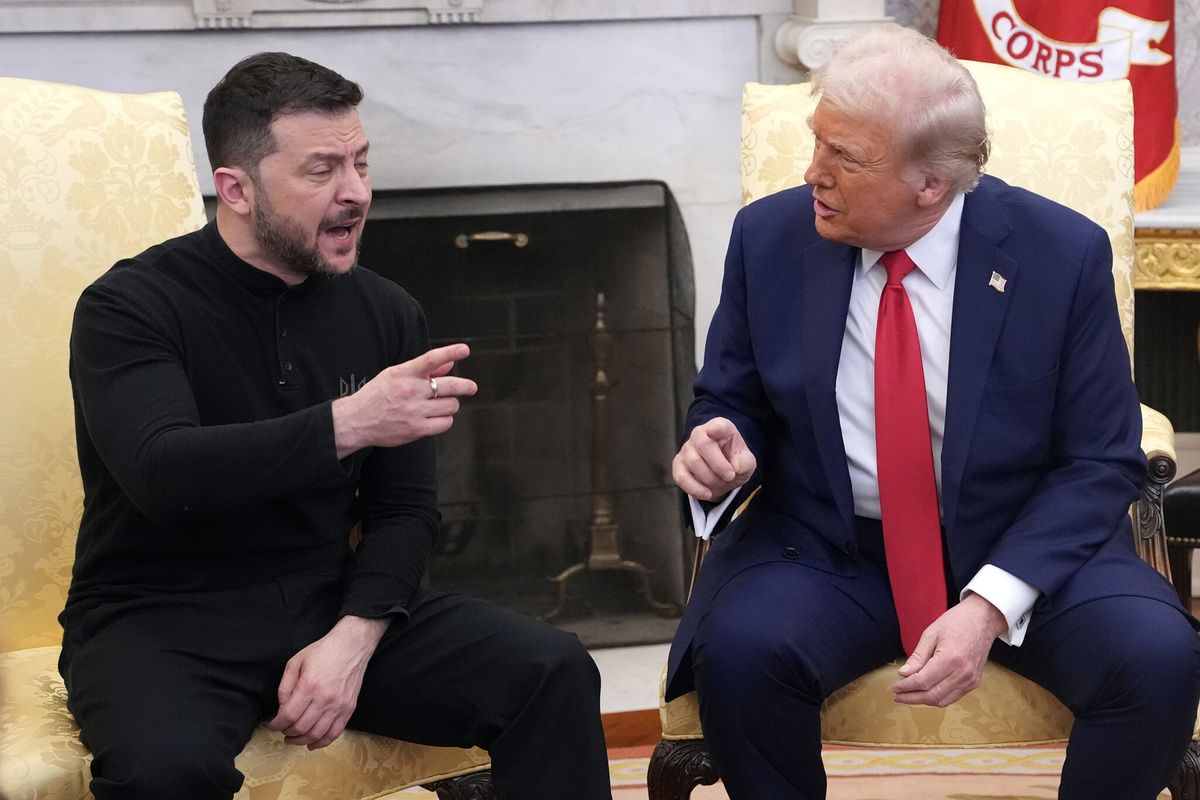After his inauguration today, Donald Trump will hold the most powerful office in the country. Just how powerful, however, is much debated. Over the past 15 years, presidential authority to pursue unilateral action in areas of foreign policy, national security, and warmaking has increased precipitously, and some argue that President Obama has expanded these authorities even further. The Cipher Brief spoke with Neal Devins, Professor of Law and Government at College of William and Mary, to find out just how much authority resides in the presidency and how checks and balances on presidential power have changed in the modern era.
The Cipher Brief: What are the major things that a president can or can’t do today without significant legislative or judicial checks?
Neal Devins: The President has broad authority to interpret federal law in ways that advance the President’s political agenda. Whenever the President does that, he is claiming to act within the authority that Congress gives him. In other words, the President can pursue a broad range of initiatives where they see space in the existing law to claim that they are acting under the authority of that law.
This can be done through executive orders, presidential directives, regulations, etc. The toolbox is quite expansive in terms of the mechanisms available to the President to be used to pursue his or her agenda. And all those things can be done unilaterally because the President’s claiming that he is acting under the authority of a laws enacted by Congress.
Obviously there are limits. For instance, Congress can authorize the suspension of habeas corpus in military tribunals but the Supreme Court could then say “we don’t care if you’re acting under the authority of Congress, you can’t suspend habeas corpus.” So there are still checks to this power.
However, the limits are ultimately pretty thin. The courts rarely slap the president down; more significant, in this polarized era, Congress has a very difficult time standing up to the President and resisting presidential unilateralism.
In addition to initiatives purportedly tied to federal law, the president has some – though not many – inherent powers. For instance, executive privilege is not based on some statute or authority that comes from Congress, that comes from presidential authority. However, these inherent powers are quite limited; the bulk of executive powers come from the president’s claim that she is simply interpreting or implementing federal law, even if they are interpreting that law in ways that would be shocking to the people who wrote that law.
On the judicial side of things, the big question is often not about the legality of the president’s conduct; instead, the fight is often over whether someone is injured in a way that justifies a lawsuit against the executive. Take Trump. You have a lot of people asking about ethics laws, conflicts of interest, the ramifications of President Trump backing out of NAFTA, etc. The question there is who would be able to go into court and stop the President.
That’s going to be a big issue because if the President relaxes law enforcement – basically saying that someone is not subject to a law or some provision of that law – it’s hard to make the case that someone has suffered an injury from that action. Now, on immigration, if the President starts deporting people, those people would have clear standing to challenge whether the President’s policy is consistent with the law, there would be no question about that. The courts would act as a check in that case, similar to how Guantanamo detainees were able to bring so many cases against the George W. Bush presidency during the war on terror because they were injured in a legitimate way.
So, for certain things where the President is acting to enforce and someone is the subject of the President’s actions, then you can have the courts serve as a check. But if the President is not acting to enforce, if he is deregulating as opposed to regulating – or if the president is acting in ways where no one suffers a specific injury—like whether the president is breaching the emoluments clause – these things may not get into court because no one will have standing to challenge the President on these questions.
TCB: Moving on to Congress and the balancing role of the legislature, could you go a little deeper into the relationship between Congress and the presidency and how that has changed over time?
ND: For convenience sake, I will use Richard Nixon as a marker and contrast what was happening at the time of Nixon and Watergate to what might happen today. This is not to say that Trump is necessarily like Nixon. We really don’t know who Trump is, I want to be clear about this, we have no idea how he will behave. I’m just trying to use Congress’ role as a check during the Nixon era as a contrast against today’s Congress.
When Nixon became president, he asserted presidential authority over the budget through impoundments – the refusal to send appropriated funds. He launched several military initiatives connected with Vietnam. And, of course, there was Watergate.
In response to all this, Congress – both Democrats and Republicans – stood up to the President: They enacted the War Powers Act, they enacted the Impoundment Control Act, they enacted the Ethics in Government Act. In general, Congress sought to serve as a check on the President, most significantly through the Watergate investigation. There you saw both Democrats and Republicans voting in support of articles of impeachment.
During this period, you had a situation where Congress as an institution was standing up in a bipartisan fashion for the interests and authorities of Congress.
When you fast forward and ask if that could happen today, the answer is probably no. The reason is that it’s extremely unlikely Congress will be able to form a bipartisan coalition of Democrats and Republicans to come together and check the powers of the President.
In today’s polarized era, you don’t see coalitions forming across the aisle the way you used to. 40 years ago – you had Southern Democrats, Northern Republicans, and things were not defined by political party so much as they were defined by coalitions of Democrats and Republicans coming together in a more bipartisan way. Today, you just don’t see that happening at all. To take the Clinton impeachment as a contrast to the Nixon impeachment, that was a strictly party-line vote. The Affordable Care Act was a strictly party-line vote. Votes on Supreme Court nominees have now become party-line votes.
Thus, in today’s era, the thought of the parties coming together to assert a shared congressional vision, or to defend congressional prerogatives, seems pretty far-fetched. This really limits the ability of Congress to check the President. And, along the same lines, as party and ideology become more important to Congress, members don’t think of institutional concerns in the same way. To use academic jargon, it’s a collective action problem. In other words, if you’re a member of Congress, what do you get for caring about congressional prerogatives in today’s political environment? You get nothing. You get a box of coal for Christmas. So many members of Congress now have no real interest in defending abstract views of congressional prerogative anymore because they get nothing for it.
However, for the President, it’s the opposite. If you want to advance your policy, you make the law fit into your policy, rather than the other way around. So you’re constantly advocating for a broader view of Presidential power, expanding the authority of the executive.
Congress is just not going to exercise an effective check against the President, particularly with a Republican majority.
TCB: When we speak of expanding presidential powers, specifically in areas of foreign policy and national security, what legacy has President Barack Obama left? What toolbox of powers and authorities has he left for President Trump?
ND: On war powers, President Obama has not really sought congressional authorization and has pursued a broad range of initiatives unilaterally. He’s effectively been the locus of policymaking in Syria, Libya, and other countries where the U.S. has national security interests.
I don’t know if that separates Obama from his predecessors. Presidents have increasingly acted unilaterally on these types of war powers issues, and they rarely seek congressional authorization. When they do, it’s only in areas where they are a little nervous about the military operation and are looking for political cover – Obama’s decision to reverse course and seek congressional authorization for strikes on Syria, for instance.
Obama has followed this path that previous presidents set out, and he has been at least as assertive as previous presidents. On the domestic front, he has been even more assertive. Concerning his directive on Immigration policy, for instance, Obama was very bold. It’s a close legal question and I’m not saying he acted illegally, but this was a very bold initiative that pushed the boundaries of presidential authority by unilaterally pursuing a major policy initiative, which has affected millions of lives. So Obama, like many before him, has advanced his policy positions through expansive readings of statutes, Supreme Court decisions, or anything else that might be useful.
The other thing that Obama did that was interesting is if he didn’t like the answer he got from say the Office of Legal Counsel, he wouldn’t leave the matter there. He would ask the White House Counsel or some other entity, which could offer him an alternative legal answer that he could then use. He was not willing, just as an internal matter, to allow the Justice Department or the Office of Legal Counsel to veto his policies. He would be willing to get a second opinion even from the White House Legal Counsel, which is not a Senate-confirmed position.
Obama was very assertive and the issue with Trump is not so much that he will reinvent the playbook or do things that no president has ever done before. It’s that he’s going to be pursuing a different set of policies. He may do more on the treaty/trade agreement front than previous presidents, in terms of trying to renegotiate or abandon them. That would separate him a little bit but I think he will still make arguments similar to the ones that Obama and previous presidents have used to act unilaterally.













